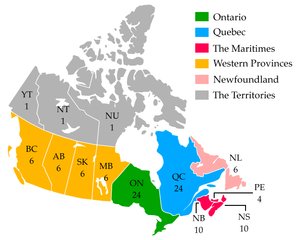The spending scandals, and the ineffectiveness of the Senate over the last few decades have now reached the point where they can be ignored no longer.
In the unlikely event that I was elected PM tomorrow, I would make Senate reform a top priority .
What else can you expect when you have a body composed of mostly party bag men, and water carriers? Seriously bag men.. accounting tricks and stretching the limits of the rules is all they know. Bag man is as bag man does. Then there are the water carriers. People who have laboured tirelessly for a party, but yet have failed in bids to achieve elected office. The result is that we have Senators chosen -for the most part- on account of their loyalty to the party or Prime Minister who appointed them,, thus when the party in power also has a majority in the Senate, what you have is little more than a rubber stamp. It's no wonder Canadians hold the Senate in contempt, and why they themselves treat the office which though not elected are supposed to serve Canadians with the cavalier attitude we have too often seen.
So what is to be done?
Do we abolish it as the NDP has long wanted to do? All that would accomplish is to remove what can be a check and balance against abuse of power, and pretty much give any majority government a free hand to advance any agenda they wish, with only token opposition.
Still, it is clear that in its current form, the Senate is not serving as much of a bulwark against absolute rule.
What about an elected Senate, one whose members serve set terms as opposed to lifetime sinecures until age 75, capped with a massive pension?
The Reform Party gained of traction by running on the idea of a "Triple E Senate" which stood for Elected, Effective and Equal. The biggest problem with that would be the need to open up the constitution and get 7 of 10 Provinces, comprising 50% of the population to sign on, which under today's landscape would be problematic , with a PQ government in Quebec, as such a scenario would require Quebec to relinquish some of their seats. The current arrangement guarantees Quebec 25% of the Senate seats in perpetuity, and was a condition Quebec demanded when it joined confederation in 1867. The irony is, that at that time, Quebec had the fastest growing population, and could eventually have gotten more Senate Seats, and wielded enormous clout, but since 1960, their population growth has plunged in comparison to the rest of the country, but they are still guaranteed that 25%.
There is, however , a way to give us two of the three E's without opening the constitution. First of all, it is the prerogative of the prime Minsister to appoint all senators... But what if he/she were to appoint ELECTED Senators?
There is precedent for this. In 1990 Albert Premier Don Getty, as part of "The West Wants IN" movement, held a non-binding Senate election, which was won by the Reform party's Stan Watters. When the anticipated vacancy came up, Prime Minister Brian Mulroney, a Progressive Conservative, astutely appointed Mr. Waters to fill that vacancy.
While initiating talks with the provinces to work out a new framework for Senate reform, I would begin immediately with a policy of only appointing elected Senators. This could be done by, when a vacancy comes up, asking the Premier of whatever province the vacancy is in to hold an election for the Senate seat. The Premier would then be able to state that the term for which the senator will be elected is 5 years, after which time the provincial election agency will issue a new writ. While not technically legally bound to observe it, since they would have agreed to the term with their provincial authority they would be morally bound to observe it.
The prime Minister would then appoint the winner, regardless of what party won.
This would bring pressure to bear on the appointed Senators who are currently riding the gravy train in exchange for their [past service and current rubber stamp (in many cases) to resign when called on to do so and face the voters , or make way for the new.
If part of the goal of reform is to use the Senate as a check and balance against either abuse or monopoly of power, since it would be the premiers and their provincial election authorities holding the Senate elections it would follow that it would be provincial parties putting up candidates to contest them, thus, you will have Senators from such diverse parties as the BC Liberals, Wild rose, Saskatchewan party, Parti Liberal du Quebec, Coalition Avenir Quebec, Parti Quebecois and so on. The effect would be that non partisan agreement would need to be reached, and there would be less chance of legislation passing that favours one region over another, since they will be watching out for the interests of their provinces. It would also put a stop to the federal government encroaching on provincial jurisdictions. This would place limits on federal power, which serves the common good, as the government that governs least governs best.
While media and party loyalists turn the current Senatorial follies into a witch hunt for partisan political gain, let's look instead at ideas by which we can make the system work for the common good of the whole country so that situations such as we have seen over the years prompting the cries for abolition or reform become the exception and not the rule.

